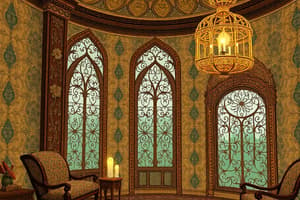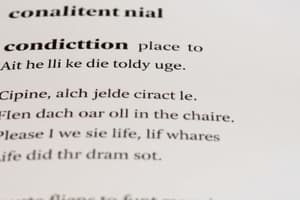Podcast
Questions and Answers
If they ____ (offer) me the job, I ____ (accept) it right away.
If they ____ (offer) me the job, I ____ (accept) it right away.
offered, would accept
I ____ (call) you if I ____ (need) help with this task.
I ____ (call) you if I ____ (need) help with this task.
will call, need
If we ____ (attend) the conference, we ____ (gain) valuable insights for our next project.
If we ____ (attend) the conference, we ____ (gain) valuable insights for our next project.
attend, will gain
If I ____ (study) harder, I ____ (pass) the exam last month.
If I ____ (study) harder, I ____ (pass) the exam last month.
She ____ (not miss) the flight if she ____ (leave) earlier.
She ____ (not miss) the flight if she ____ (leave) earlier.
If we ____ (hire) more staff, we ____ (be able to) finish the project faster.
If we ____ (hire) more staff, we ____ (be able to) finish the project faster.
Which of the following sentences correctly uses the zero conditional?
Which of the following sentences correctly uses the zero conditional?
The first conditional is used for hypothetical situations.
The first conditional is used for hypothetical situations.
What is the structure of a second conditional sentence?
What is the structure of a second conditional sentence?
If I ____ (study) more, I ____ (pass) my last exam.
If I ____ (study) more, I ____ (pass) my last exam.
Select the sentence using the correct first conditional form.
Select the sentence using the correct first conditional form.
Match the type of conditional with its correct description:
Match the type of conditional with its correct description:
In the third conditional, we use 'would' followed by the past perfect.
In the third conditional, we use 'would' followed by the past perfect.
If she ____ (practice) daily, she ____ (improve) her skills.
If she ____ (practice) daily, she ____ (improve) her skills.
Flashcards are hidden until you start studying
Study Notes
Zero Conditionals
- Express general truths or facts that are always true.
- Use the present simple tense in both clauses.
- Example: If you heat water to 100°C, it boils.
First Conditional
- Express real or likely situations in the future.
- Use the present simple in the if-clause and the future simple in the main clause.
- Example: If you finish the report by tomorrow, we will have time to review it before the meeting.
Second Conditional
- Express hypothetical or imaginary situations.
- Use the past simple in the if-clause and would/could/might + base form of the verb in the main clause.
- Example: If I had more time, I would take an advanced English course.
Third Conditional
- Express hypothetical situations in the past.
- Use the past perfect in the if-clause and would have + past participle in the main clause.
- Example: If I had studied harder, I would have passed the exam last month.
Zero Conditional
- Used to describe general truths or facts.
- The structure is if + present simple, present simple.
- Example: If you heat water to 100°C, it boils.
First Conditional
- Used for real situations that are likely to happen.
- The structure is if + present simple, will + base form.
- Example: If you finish the report by tomorrow, we will have time to review it before the meeting.
Second Conditional
- Used for hypothetical situations, unreal or unlikely to happen.
- The structure is if + past simple, would + base form.
- Example: If I had more time, I would take an advanced English course.
Third Conditional
- Used to speculate about past events that did not happen.
- The structure is if + past perfect, would have + past participle.
- Example: If I had studied harder, I would have passed the exam last month.
Zero Conditionals
- Used to express general truths or facts that are always true.
- The structure is: If + present simple, present simple.
- Example: "If you heat water to 100°C, it boils."
First Conditionals
- Used to talk about real or possible situations in the future.
- The structure is: If + present simple, will/won't + base form of verb.
- Example: "If you finish the report by tomorrow, we will have time to review it before the meeting."
Second Conditionals
- Used to talk about hypothetical or imaginary situations in the present or future.
- The structure is: If + past simple, would/could/might + base form of verb.
- Example: "If I had more time, I would take an advanced English course."
Third Conditionals
- Used to talk about hypothetical or imaginary situations in the past that did not happen.
- The structure is: If + past perfect, would/could/might have + past participle.
- Example: "If I had studied harder, I would have passed the exam last month."
Studying That Suits You
Use AI to generate personalized quizzes and flashcards to suit your learning preferences.




